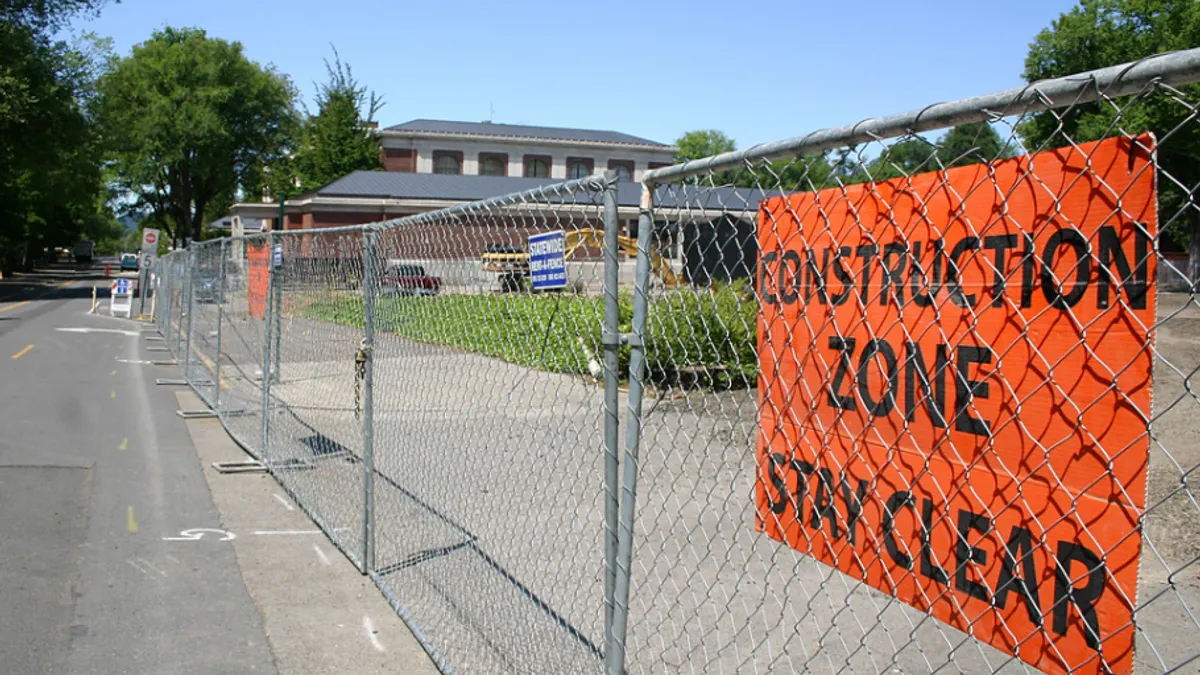This summer has seen a number of racist incidents on jobsites reported to construction company management and local law enforcement authorities. These cases include ropes fashioned in the shape of nooses and racist grafitti on portable restrooms.
Police are investigating these incidents and in many cases the companies involved, including Turner Construction, have provided mandatory antibias training to everyone on site before reopening. (See Special report: How racism impacts construction.)
In light of these reports, Construction Dive asked readers about their experience with racism on jobsites and what can be done to help increase racial harmony in the industry. Sixty-five percent of respondents said they had witnessed a racist incident on a jobsite, with some longtime construction pros saying they have seen many of them during their careers.
"I have seen and heard countless acts of racism on jobsites," wrote one reader. "I am now in the office and sitting in on jobsite meetings and still seeing and hearing the same nonsense."
The ways discrimination is expressed varies, readers said, and is often subtle, such as slurs written on portable toilet walls, failing to share information or opportunities with minorities, not passing on knowledge to apprentices of color or perpetuating racial stereotypes.
"Not much is typically said face to face. Some comments are made in passing during gossip and such," wrote one reader.
Respondents offered ideas as to why the construction industry grapples with racism. Several noted that because there are few minorities on jobsites, some workers feel emboldened to perpetuate discriminatory behavior. One respondent called it "juvenile and/or superiority mentalities/behaviors, which can persist across generations."
Another said the problem often stems from the high-stress nature of construction work.
"Unfortunately, when you mix cultural differences together on a confined jobsite where workers are stressed with deadlines and production requirements, it leads to a sometimes volatile situation. It shouldn't, but it does."
Seventy-seven percent of respondents said that nothing was done to address the incidents they witnessed. Many readers applauded Turner Construction's quick response to cases on several of its Ohio sites.
"As Turner makes a statement and closes its jobsites down for racism I can only hope others join," said one respondent. "I hope more companies take a stand to try to curb this racism pandemic."
Wrote another: "Kudos to Turner Construction for taking strong and immediate action in addressing these incidents and reinforcing a zero-tolerance position. The spotlight may currently be on them, but this issue affects all contractors, large and small."
One reader said improvements will only occur through training such as Turner provided. "I am a women in a managerial position and everyday I experience sexism for my strong attitude and racism due to my Hispanic background. The [jobsite] culture needs to be more inclusive and open to change and that will only happen with forced training."
Alternatively, respondents said that companies that only give lip service to diversity and inclusion are part of the problem.
"A tangible solution is to actively hire more from underrepresented groups, not only as craft or engineers, but even in leadership," said one reader. "Diverse leaders will help ensure that the overall company environment is all-inclusive. It's also important to have diversity/inclusion initiatives that actually take action. Some companies have these mainly for publicity reasons, but don't promote any real change or support."
One reader said that racism against disadvantaged groups is declining and a few others said that racism is not a problem.
"The racism that I have seen on jobsites has improved in recent years and I don't remember seeing any racism in the last few years," said one.
On the other hand, some readers said that in light of recent incidents, they were examining their part in perpetuating discriminatory attitudes.
"I had to ask myself, 'Unless freshly cleaned, does a person acquiesce to the fact that will be unsavory graffiti on the wall every time they use a porto-john?' or should I have been more vocal to an acquaintance who started to go 'rogue' in a conversation instead of letting a statement go unchecked?"
The bottom line, many said, is that workers who commit outwardly racist acts need to be weeded out of the industry.
"Whoever committed the acts of racism needs to be properly reprimanded. A reason racism continues in the workplace is because no real consequences are made," said one reader.














